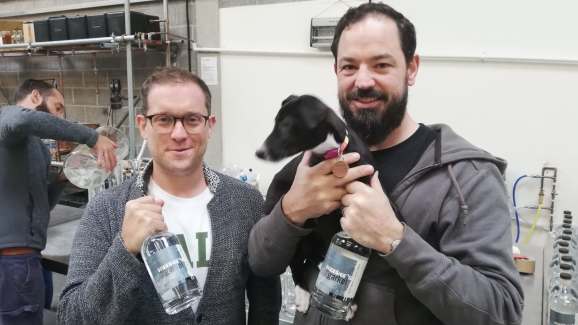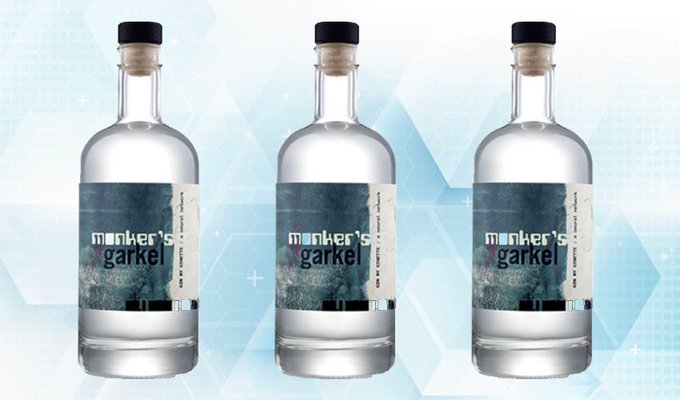Liam, Danny, and Dizzy the dog from Circumstance Distillery celebrate the launch of the world’s first AI gin.
Image Credit: Tiny Giant
By JEREMY HORWITZ@HORWITZ
Source: venturebeat.com, November 2019
Two years ago, I owned a bar with over 300 different gins — one of the largest collections of juniper-flavored spirits at any establishment in the United States. None of those gins was designed by a computer, a fact that my bartenders would likely have explained was for the best: A gin’s non-juniper botanicals are what make it distinctive, and the most popular recipes have traditionally come from experienced distillers.
But now that we’re in the AI-as-possible-gourmand era, what if a trained AI system took over the process of formulating, naming, labeling, and even marketing a new type of gin? Could artificial intelligence — aided somewhat by humans — create a viable product?
Somewhat surprisingly, the answer is “yes.” This weekend, Bristol, UK-based Circumstance Distillery and creative technologists Tiny Giant debuted Monker’s Garkel as “the world’s first gin created by artificial intelligence,” and though I was skeptical about AI’s actual role in the project, machine learning had a greater influence in the outcome than might be imagined.
Trained with a database of potential ingredients, a recurrent neural network named “Ginette” generated a range of roughly 20 recipe options with anywhere from six to nine botanicals — fair numbers given typical gin distilling recipes. Circumstance’s human distillers narrowed the list down to four options, then two, expecting that they’d prefer a mix of juniper, damson plum, fig, burdock, carrot, and cinnamon. But while “good,” that recipe turned out to be “less interesting” in flavor profile than the winning mix of juniper, coriander, angelica root, prune, gooseberry, raspberry, clementine, orange, and marigold.

Given my own experience with gins, including the knowledge that even seemingly small variations in one key ingredient might radically change the flavor of one batch of gin compared with another, I wondered just how little input people had in the final mix. So I wasn’t shocked to hear that humans selected the ultimate proportions of each ingredient, just as they’d narrowed down more viable recipes from a larger batch of AI suggestions, and kept tweaking those proportions until they properly produced layers of flavor.
I don’t like to use the word “never” when discussing AI’s ability to replace humans at various tasks. But if anything strikes me as likely to require a lot more engineering effort, replacing experienced distillers’ flavor judgments with an equivalent or superior AI alternative (as judged by human tongues) would be quite high on the list.
Ginette wasn’t only responsible for selecting botanicals. Using another dataset, the AI also came up with the Monker’s Garkel name, which sounds like something straight out of the Hitchhiker’s Guide to the Galaxy, as well as multiple human-rejected alternatives: Digby Six, Pibbery, and Kinto City. Ginette is also credited, in combination with other ML tools, with generating the labels, the bottle’s text, and social media copy that appears on the Gginmaker Twitter account.
Circumstance is leaning into the idea that “robots make good distillers but are rubbish at branding,” and that’s probably for the best. The Ginette-generated tweets are nearly nonsensical, and its labels are only modestly more attractive than a sci-fi book cover from the 1970s. Moreover, that’s after human beings have — like the gin recipes — filtered the results to keep you from seeing most of the raw nonsense a computer would spit out on its own.
So did AI actually design Monker’s Garkel gin? Sure, albeit with lots of assistance from humans, and not without rough edges that leave plenty to be smoothed out in the future.
If you’d like to learn more about “artificial gintelligence,” a Tiny Giant Jams podcast (with human participants from Circumstance) discusses the story. And if you’re in the UK, you can sample Monker’s Garkel yourself for £42 ($54) per 500ml. That’s more expensive per liter than popular brands such as Bombay Sapphire and Hendrick’s, but more limited in quantity: Only 1,000 bottles are being made.
We’ll have to see whether that’s enough to satisfy demand for the world’s first AI gin. Regardless, I strongly suspect that it won’t be the last AI-developed spirit, nor will it be the most AI-developed spirit, particularly if the Circumstance and Tiny Giants teams keep iterating on the idea.



